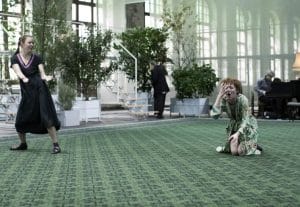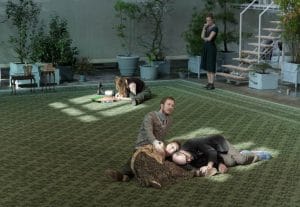In recent years, the artistic director of Toneelgroep Amsterdam, Ivo van Hove, made three performances of works by Couperus. In three short interviews, I look back at the latter, Little Souls. Despite the long meandering sentences and the romantic, sometimes very passive characters, this book (or rather it is four books)is a timeless masterpiece that, as far as I am concerned, deserves all the attention.
Earlier I spoke to the editor of the 'books of little souls' Koen Tachelet and then the dramaturg of this latest production, Jan Peter Gerrits. Finally, I asked actress Maria Kraakman about 'her' Couperus.
Couperus actress with the right temperature
Maria Kraakman can now be called a real Couperus actress. Back in 2007, she performed the title role in Eline Vere of the Nationale Toneel. At Toneelgroep Amsterdam, she starred in every part of Van Hove's triptych. She shaped three completely different women: the intellectual Eva Eldersma in Silent Power, the cordial Ina d'Herbourg in Things that pass and hedonistic Mathilde in Little Souls.
I am simply curious to see how this frail actress shapes the blushing voluptuous Mathilde. It is a wonderfully incredible transformation about which Kraakman himself modestly says ' Ivo cast on temperature'. This Mathilde bubbles over with zest for life. Every movement of her hips say: 'Dance, laugh, admire!'

For Maria Kraakman, there is a Couperus before and a Couperus after Bas Heijne. This writer and publicist blew the dust off Couperus. He did so, among other things, in the Huizinga lecture and the collection of essays ''Fear and Beauty'. He liberated Couperus's universal themes from the Hague microcosm. Desires, seeking a grip on life and shaping one's identity are undeniably topics we also struggle with in the 21st century.
Colonial relevance
In recent years, the actress was also touched by Couperus' more committed side. How he wrote about the East Indies at the time with an awareness of exploitation and oppression, a conversation that is still going on over 100 years later.
The Netherlands is still struggling to come to terms with its Dutch East Indies era and the wealth acquired by force. In recent months alone, the widows of the Sulawesi massacre received reparations. There was a court case over whether Dutch marines were ordered to summary execute the Moluccan hostage-takers of the train hijacking in De Punt. And last week, the Dutch government awarded pensions to surviving KNIL soldiers. In short, the Netherlands is still struggling with the dark side of its former domination role in the colonies.
The blushing outsider
In this play by Little souls however, India is far away, even Hague life seems an eternity ago for the wandering souls in the villa at Driebergen-Zeist. Only Max Brauws, the family friend portrayed by Hans Kesting, recounts his failed attempts to become a labourer and inequality that remained between him and others. After all, thanks to his family capital, he could always leave.
So Maria Kraakman plays a brilliant Mathilde, that blushing healthy doctor's wife who longs to return to The Hague. To a life of class with her posh doctor-husband and their two children. Visits, dresses, perhaps court. These are the dreams of a simple girl who married her way up and never wants to look back. Mathilde is the woman 'you love to hate'. Addy married her to make an example of his family, so can it be! Her health is refreshing and enviable in contrast to Constance's sickly family. They look down on her and her 'flat' desires. And she too competes with the others for Addy's attention.

Kraakman calls Mathilde perhaps one of the most contemporary characters with her individual search for happiness as the highest good. Mathilde is also jealous, of the delicacy and pedigree of her in-laws. She does not speak their language and will never become one of them.
The woman who has everything?
Kraakman outlines how Van Hove gives you a lot of room as an actor to show things, 'show, don't tell'. I (HR) saw this reflected in numerous tableaux vivants the actors create. On the large carpet depicting the house, Mathilde and her in-laws hushed in poses. Poses in which they yearn for love from their Addy. A nice reference to the decadent pastimes of the upper circles is thus woven into life in that quiet house, where people can only dream. Mathilde too. For when Addy finally gives in and offers to start a new life in the big city with her, she cannot accept the superiority of his sacrifice.
After two hours of blistering theatre, it is not Mathilde, but another woman who dares to go live
Click for performance dates of all three shows and tickets hir.
